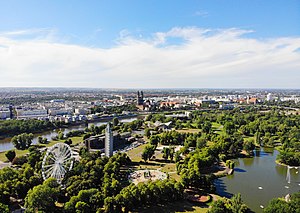In the grand tapestry of Baroque music, few threads shine as brightly or are woven as intricately as that of Georg Philipp Telemann. Born on March 14, 1681, in Magdeburg, Germany, Telemann would go on to become one of the most prolific and influential composers of his era, leaving an indelible mark on the world of classical music that resonates to this day.
From an early age, Telemann displayed an insatiable appetite for music, teaching himself to play various instruments with remarkable speed and proficiency. Despite his family’s initial resistance to his musical pursuits – they had hoped he would pursue a career in law or the church – young Georg’s talent was undeniable. By the age of ten, he had already composed his first opera, setting the stage for a lifetime of musical innovation and creativity.
As Telemann matured, so did his musical prowess and ambition. He studied at the University of Leipzig, ostensibly to pursue a law degree, but music remained his true passion. It was during this time that he founded the Collegium Musicum, a student musical society that would later be directed by none other than Johann Sebastian Bach. This early foray into musical leadership foreshadowed Telemann’s future role as a pivotal figure in the musical life of Germany.
Telemann’s career took him to various cities across Germany, including Sorau, Eisenach, and Frankfurt, before he finally settled in Hamburg in 1721. It was in Hamburg that Telemann would spend the remainder of his life and produce some of his most enduring works. As the musical director of the city’s five main churches and the leader of various musical ensembles, Telemann’s influence on the musical landscape of Hamburg – and indeed, all of Germany – was profound and far-reaching.
What set Telemann apart from his contemporaries was not just the quality of his compositions, but their sheer quantity. Over the course of his long and productive life, Telemann composed an astonishing number of works – more than 3,000 by some estimates. His oeuvre includes over 1,000 church cantatas, 46 Passions, numerous operas, orchestral suites, concertos, chamber music pieces, and songs. This prodigious output, coupled with his innovative approach to composition, earned him widespread fame and admiration during his lifetime.
Telemann’s music is characterized by its melodic inventiveness, rhythmic vitality, and a unique blend of national styles. He was particularly adept at incorporating elements of French, Italian, and Polish music into his compositions, creating a cosmopolitan sound that appealed to a wide audience. His ability to write music that was both sophisticated and accessible made him enormously popular, and his published works were in high demand across Europe.
Beyond his compositions, Telemann made significant contributions to music publishing and education. He was one of the first composers to publish his own works, bypassing traditional publishing houses and selling directly to the public. This innovative approach not only increased his income but also helped to disseminate his music more widely. Additionally, Telemann wrote several important treatises on music theory and performance practice, further cementing his status as a leading musical authority of his time.
Despite his immense popularity during his lifetime, Telemann’s reputation suffered somewhat in the centuries following his death. For many years, he was overshadowed by contemporaries such as Bach and Handel. However, the 20th century saw a revival of interest in Telemann’s music, with scholars and musicians alike rediscovering the depth, variety, and quality of his compositions.
Today, Georg Philipp Telemann is rightfully recognized as one of the giants of Baroque music. His vast body of work continues to be performed, recorded, and studied, offering modern audiences a window into the rich musical world of the 18th century. Telemann’s legacy extends beyond his compositions; his innovative approach to music publishing, his efforts to blend different national styles, and his commitment to music education all helped to shape the course of Western classical music.
As we listen to Telemann’s music today, we are reminded of the power of creativity, innovation, and sheer determination. From a young boy defying his family’s wishes to pursue his passion, to a revered composer whose works were celebrated across Europe, Telemann’s life story is as inspiring as his music is beautiful. His contributions to the world of music continue to enrich our cultural heritage, ensuring that the name Georg Philipp Telemann will be remembered and celebrated for generations to come.


